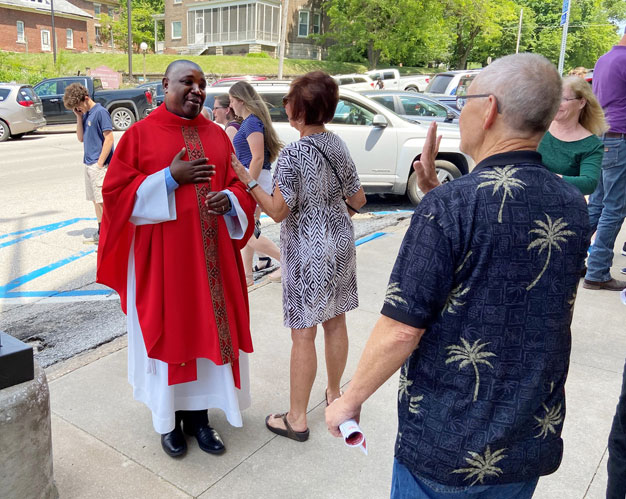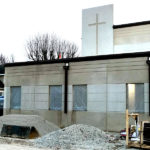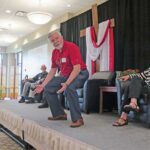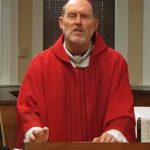
Father Denis Hatungimana uses his head, instead of his racquet, to play ping pong with youths from Divine Mercy Parish in Burlington.
By Barb Arland-Fye
The Catholic Messenger
BURLINGTON — Father Denis Hatungimana broke into song — in Swahili — during his homily on Pentecost Sunday, the birthday of the Church, which happened to be his 50th birthday. “It’s a day of joy,” he said, projecting exuberance to the faithful at St. Paul Church on June 5. In addition to celebrating Pentecost and his birthday, he had the joy of confirming a new member of the Catholic Church, he said.
“Joyful” is the adjective pastors and parishioners choose to describe Father Denis, a priest from Tanzania serving temporarily as parochial vicar at Divine Mercy Parish in Burlington-West Burlington and St. Mary Parish-Dodgeville. He also serves African communities at St. Mary Parish in Iowa City and Ss. Mary & Mathias Parish in Muscatine. He is an expatriate priest, which means he is living temporarily or permanently outside his country of origin.
“We have found in Father Denis a very joyful priest and one who is trying to learn from parishioners,” says Father Marty Goetz, pastor of Divine Mercy and St. Mary-Dodgeville. “He is not only ministering to them, but they are also teaching him … I think they are teaching him that he can be himself.”
Father Denis, who arrived in Davenport in 2017 and earned a Master of Organizational Leadership in December at St. Ambrose University in Davenport, will eventually return to Tanzania to minister to the people in his homeland.
He is one of several expatriate priests assisting the Diocese of Davenport, which like many other U.S. dioceses is dealing with a shortage of priests. As African expatriate priests arrive in the U.S. to alleviate the shortage, collaboration between priests and parishioners is essential to ensure the experience is positive, says Father Francis Odoom. He is a priest from Ghana who served at parishes in the Davenport Diocese while completing advanced studies at St. Ambrose University. He earned a Doctorate in Business Administration this spring, researching the transitions of African expatriate priests to rural U.S. Catholic churches. His dissertation explored the challenges the priests face and what would help make the transition easier.

Father Denis Hatungimana talks with a parishioner after Mass at St. Paul Church in Burlington June 5.
Getting to know you
Father Denis said the main factor making his transition possible was “first to love the people of the Diocese of Davenport, getting to know their culture, their lifestyle and to understand their likes and dislikes.” These factors “help to contextualize the Word of God, which although it is the same, can be understood differently depending on the background, assumptions and culture of the people. Other key factors were to try to get used to the American accent, try to be a good listener, try to be patient and humble, and try to be ready to adapt and to serve the people with an open mind and heart.”
“The biggest thing is the welcome,” Father Marty said. “We tried to make Father Denis feel at home. We include him in (Burlington Notre Dame) school activities. He’s been to baseball games, basketball and soccer games. The kids love him. He went with the sophomores to visit the Archbishop Fulton J. Sheen Museum in Peoria, Illinois.”
Father Marty says the biggest challenge for parishioners and Father Denis is a bit of a language barrier — some people have to listen harder to understand. Also, the need to explain American activities and traditions. “Last Saturday night we went to a baseball game and had to explain the rules. It’s fun to do that, though,” Father Marty said.
Tammy Bellrichard, Divine Mercy Parish’s youth minister, lived and worked overseas and instinctively looked for ways to connect the youth group and Father Denis. “He tells me he loves ping pong, so I’m all over it. We had a ping pong tournament early in May at the Y.”
During the pandemic, when ministry was happening virtually, Tammy and the youths were reading the book “Ablaze, Stories of Daring Teen Saints,” one of whom was St. Kizito, a 14-year-old martyr from Uganda. Father Denis was delighted to learn that Tammy and the youths knew about the saint, whose feast day is June 3. “I talked to the kids and said, ‘I think we need to celebrate St. Kizito Day’ and so we did,” Tammy said.
She chose to prepare a meal from Uganda, a stew that included “matoke,” a plantain. Father Denis “brought us real matoke and said, ‘We’ll have rice. Get some jasmine rice.’ He brought his rice cooker and helped prepare the meal. We had so much fun.”
The Tanzanian priest’s presence and immersion in parish life provide an opportunity for parishioners to learn about the universality of the Catholic Church and the things that Catholics of different cultures share in common, Tammy said.
Reaching out to fill the gap
Father Denis presides at Mass for Congolese Catholics at St. Mary Catholic Church in Iowa City once a month. He also visits weekly with leaders of the Congolese community, which numbers about 100 families, said Father Steve Witt, St. Mary’s pastor.
“We’d been trying to make arrangements to have Father Denis here, using his knowledge of French because I didn’t have the language skills,” Father Steve said. Bishop Thomas Zinkula assigned Father Denis to assist with the Congolese community in Iowa City. “He works really hard with the Congolese leadership,” Father Steve said. “He’s up here every Friday meeting with them. He is quite an advocate for them. I am very impressed. He is very outgoing. He reaches out to the staff and really reaches out to the Congolese community, particularly. This just works like crazy.”
The French-speaking Africans “are so happy to celebrate Mass in French, which is understood by most of the community members,” Father Denis said. “They think of it as a miracle, which God has done for them so that they can get spiritual services in the language they can understand.”
At Ss. Mary & Mathias Parish in Muscatine, “Father Denis is helping us to find out who is here in Muscatine. Before he started his work here, we knew we had some recent African immigrants, but we didn’t know much about them,” Father Chris Weber, the pastor, said. “He is helping us to reach out to them, to learn who they are and how we, as a parish, can better serve them.” At the first gathering with the African immigrants, “over 50 people came, and we started to identify needs like getting children baptized, getting marriages regularized, and so on.”
Father Denis appreciates his positive interactions in the parishes where he serves but also hopes for constructive criticism “on what they wish I could improve in my ministry and in my life.”
Advice to other African priests
Some African expatriate priests across the country have experienced racism, according to Father Francis’ research. That has not been the experience of Father Denis. He believes the people he serves do not look at “the color of the skin but the color of the heart. They want someone who can serve and take care of them,” he said. “I have nothing related to racism in my background…. What I see is that all persons have been created in the image of God.”
His advice to other African priests who may serve in the Diocese of Davenport in the future: “Knowing the people and their needs is important, especially in terms of culture, relationships and lifestyle.” African priests need to understand how people interpret punctuality, the sense of individualism over community and what offends people. Also, “people like a person who makes some initiatives to speak their language, especially by knowing some key words in American English, such as ‘you’re so great,’ ‘you’re awesome,’ ‘correct?,’ ‘I can’t wait,’ ‘wonderful,’ ‘it’s so true,’ ‘oh man,’ ‘oh boy,’ ‘my goodness,’ ‘hilarious!’ and so on.”
“People are generally peaceful people who love to see success in their life and in the Church as well,” Father Denis said. They are “open to receiving a missionary priest, especially when the missionary priest is humble, respectful, open minded and with a good sense of humor.”











